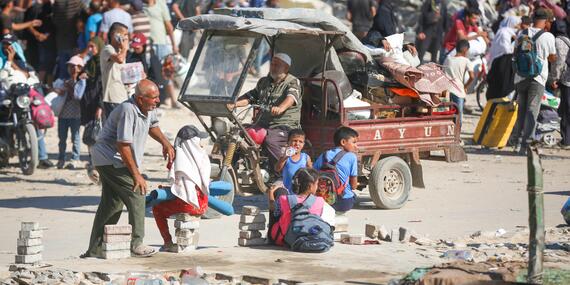Today's top news: Occupied Palestinian Territory, Lebanon, Ukraine, Sudan

Occupied Palestinian Territory
OCHA reports that a new evacuation order this morning issued by the Israeli military has further shrunk the Israeli-designated humanitarian area to 11 percent of the Gaza Strip.
Six blocks are affected by the new evacuation order in Deir al Balah and Khan Younis, including two within the Israeli-designated humanitarian area in Al Mawasi in western Khan Younis.
More than 120 displacement sites are affected, hosting an estimated 170,000 people. The new order also affects humanitarian facilities, including a World Food Programme warehouse, while there is already a major shortage of storage capacity in Gaza which affects our ability to receive and dispatch assistance.
Many of the displaced concerned by today’s evacuation orders had just recently arrived in the area, after having followed earlier evacuation orders. OCHA dispatched a small team on the ground and they saw thousands of people on the move, including many children and women. They were moving towards Deir al Balah without clear destination. Once again, they had to leave in a hurry with nowhere to go being surrounded by death and destruction.
In the month of August, the Israeli military has issued eight evacuation orders affecting tens of thousands of people in Khan Younis and to a lesser extent, in northern Gaza. Combined, the ongoing shortage of shelter supplies, including tents and hygiene supplies such as jerrycans and shampoo and limited access to basic services at arrival sites are exacerbating conditions facing displaced families.
Lebanon
OCHA says that ongoing hostilities in Lebanon and daily exchanges of fire across the southern border continue to affect civilians on both sides.
Since October 110,000 people have been displaced, 35 per cent of whom are children and almost 150,000 people remain within the 10-kilometer Blue Line.
According to the World Health Organization,16 attacks on healthcare have been reported since October last year and 21 paramedics have been killed in hostilities. Severe damage to water, electricity, telecoms infrastructure and roads in southern Lebanon have been recorded.
23 per cent of the population is now food insecure, up from 19 per cent in March 2024.
The UN and partners continue to scale up relief efforts, in support of the Government-led response. But additional funding is urgently needed. Humanitarian partners need US$110 million for ongoing response for conflict-affected people until the end of the year.
Before the escalation of hostilities in October 2023, an estimated 3.7 million people were already in need of humanitarian assistance. The 2024 Lebanon Response Plan is only 25 per cent funded with $670 million received of the total $2.72 billion required.
The UN urges all parties to respect their obligations under international humanitarian law, stressing that civilians and civilian infrastructure must be protected at all times.
Meanwhile, Deputy Special Coordinator, Resident Coordinator and Humanitarian Coordinator for Lebanon, Imran Riza, will brief the UN press corps during the Daily Press Briefing at 12 p.m. New York time on Tuesday, 20 August. He will provide an overview of the situation, emergency response, and preparedness, as well as share his impressions from his planned mission to southern Lebanon for World Humanitarian Day.
Ukraine
Attacks in Ukraine's Donetsk, Kharkiv, Kherson and Sumy region continued to impact civilians. Local authorities report 25 civilian casualties, including children. The strikes damaged homes, schools and energy infrastructures and impacted a Government-led aid distribution point.
People continue to leave front-line areas as hostilities continue. Complementing the efforts of local authorities and first responders, aid organizations provided emergency humanitarian assistance in front-line communities and to those displaced in the Donetsk and Sumy regions and elsewhere. UN and partners registered 1,800 evacuees for multi-purpose cash assistance in Sumy alone since 6 August.
In July, more than $3 million in multi-purpose cash assistance was disbursed to over 10,000 people in Donetsk and Sumy Regions.
Sudan
Sudan's Humanitarian Coordinator, Clementine Nkweta-Salami, today welcomed the decision by Sudanese authorities to re-open the Adre crossing from Chad to Darfur.
The Adre crossing is a critical humanitarian route for the delivery of emergency assistance to millions of people, including food, nutrition supplies, medicine and shelter.
The crossing point has been closed since February and humanitarian partners have been using the Tine border crossing into North Darfur - still from Chad - but the ongoing rainy season has made this route largely impassable.
Nkweta-Salami said that we have been relentlessly advocating for the reopening of the Adre crossing, as it is the most effective and shortest route to deliver humanitarian assistance to Sudan at the scale and speed required, especially to Darfur.
Food insecurity in Sudan has reached record levels, with nearly 26 million people in acute hunger. On 1 August, famine conditions were confirmed in Zamzam displacement camp near Al Fasher in North Darfur. Food security experts warn that civilians in a further 13 localities in other parts of Sudan are at risk of famine.
Nkweta-Salami said that every minute and every mile counts – and can mean the difference between life and death for the millions of people affected by this conflict. She also called for urgent funds to scale up the efforts.
More than seven months into the year, the $2.7 billion Sudan humanitarian appeal for 2024 is just 37 per cent funded, with $1 billion received.
